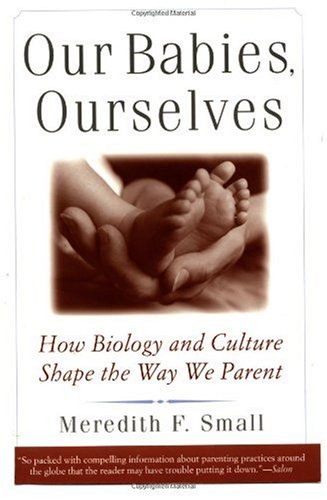Mother-Baby Social Play
But there is more to the interaction than a matter of adults putting on i a show. When babies and adults interact, they are partners in an interactive social dance in which they jointly regulate each other, and this dance is essential for the baby's social and psychological development Renowned pediatrician T. Berry Brazelton noticed in his practice that babies and mothers seem to follow a typical pattern of play, a synchronized score that moves from attention to nonattention with both partners cueing in on each other's signals. In the lab, babies were offered a fuzzy monkey on a string; and later, when the monkey was removed, mothers were asked to play with their babies. The babies played with the stuffed monkey in a different way than they did with their mothers With the monkey, they focused on it and reached for it, but soon became bored and turned away, never looking at it again. With the mother, the baby engaged with her face, became attentive and excited, and then slowly showed signs of inattention. The mothers all seemed to be highly sensitive to the cycle of attention/nonattention and responded to the "down time" by letting the baby be; and then the cycle started all over again. In experiments where a mother was instructed to act unresponsive to baby movement, the baby repeatedly tried to engage the mother by flapping around and looking at her. When she did not respond, did not take up the baby's initiative toward interaction—looking at each other and paying attention to each other—the baby gave up, looked hopeless, and began self-comforting movements such as sucking on its fingers. As Brazelton points out, with objects the goal is to explore and discover but with people the goal is to engage. And babies happily engage in social play not with some specific goal in mind but simply to establish joint regulation with another human. This is just what one might expect from a human baby, a creature that is adapted to be both an object manipulator, or tool user, and a highly social animal, Child development expert Edward Tronick has pointed out that our most central human adaptation is our communicative competence, and one of a baby's most powerful, most highly adapted, most necessary skills is the ability to exchange on a social level with adults.
Notes:
How babies actively seek to engage with mothers socially, connecting with them.
Folksonomies: parenting motherhood babies infancy infants
Taxonomies:
/family and parenting/babies and toddlers (0.679203)
/art and entertainment/visual art and design (0.339680)
/shopping/resources/loyalty programs (0.333520)
Keywords:
babies (0.900665 (positive:0.309309)), T. Berry Brazelton (0.874108 (positive:0.585706)), Mother-Baby Social Play (0.858005 (neutral:0.000000)), interactive social dance (0.816140 (positive:0.308560)), expert Edward Tronick (0.773419 (positive:0.789165)), highly social animal (0.772757 (positive:0.536385)), central human adaptation (0.760352 (positive:0.789165)), mothers (0.733676 (positive:0.520622)), fuzzy monkey (0.626416 (negative:-0.276398)), typical pattern (0.581202 (positive:0.585706)), different way (0.580524 (neutral:0.000000)), object manipulator (0.576385 (neutral:0.000000)), communicative competence (0.574803 (positive:0.789165)), baby movement (0.570763 (negative:-0.537461)), other—the baby (0.565438 (negative:-0.387145)), joint regulation (0.562078 (neutral:0.000000)), tool user (0.561014 (neutral:0.000000)), self-comforting movements (0.558067 (negative:-0.662386)), necessary skills (0.555330 (positive:0.790617)), human baby (0.555241 (positive:0.326312)), specific goal (0.554481 (neutral:0.000000)), social level (0.552508 (positive:0.790617)), adults (0.472440 (positive:0.790617)), attention (0.410602 (negative:-0.037372)), development (0.403423 (positive:0.687436)), partners (0.395772 (positive:0.329167)), cycle (0.388950 (positive:0.211354)), inattention (0.376096 (negative:-0.412665)), pediatrician (0.364919 (positive:0.585706)), matter (0.353154 (neutral:0.000000))
Entities:
T. Berry Brazelton:Person (0.757564 (positive:0.585706)), Edward Tronick:Person (0.411865 (positive:0.789165))
Concepts:
Infant (0.944126): dbpedia | freebase | opencyc
Child development (0.930715): dbpedia | freebase
Pediatrics (0.767649): dbpedia | freebase | opencyc
T. Berry Brazelton (0.697452): dbpedia | freebase | yago
Developmental psychology (0.688401): dbpedia | freebase | opencyc
Childbirth (0.673040): dbpedia | freebase
Adaptation (0.657461): dbpedia | freebase | opencyc
Kitty Brazelton (0.654892): website | dbpedia | freebase | yago






